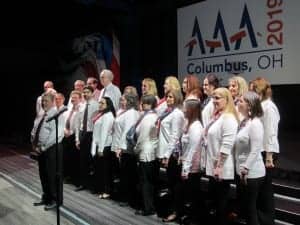
[Click on images to enlarge.] The all-audiologist AAA Chorus, directed by David Speidel and organized by Bob DiSogra, started off the General Session with the National Anthem.
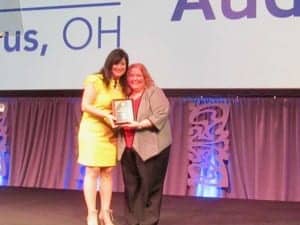
AAA President Lisa Christensen presented 2019 Program Chair Erin Miller with the President’s Award for her outstanding job in formulating the convention program.
But audiologists who didn’t attend this year’s convention missed out. Whatever the turnout, the 2019 conference was anything but disappointing on the educational front and the quality of presentations—and lived up to its slogan “The Best of Audiology.” Program Chair Erin Miller, AuD, and her colleagues crafted an exceptional selection of feature sessions, seminars, technology updates, and workshops, in addition to the traditional offerings, with themes that included how to position your business for the upcoming class of OTCs, a full-day Scientific Conference which focused on advances in hearing aid technology, numerous workshops and industry updates.
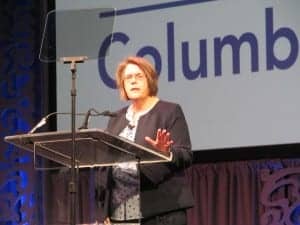
AAA President-elect Catherine Palmer implored members to remind people that audiology changes lives and patient outcomes—and should be thought of as essential component in general healthcare.
Setting the course for the Academy. At the General Assembly, AAA President Lisa Christensen, AuD, paid tribute to past presidents of the Academy and called on them to continue to help guide her. Dr Christensen says she has conducted monthly conference calls with these leaders to get their input “as we move into the next 30 years of the Academy…As we looked into the current state of the Academy, it became clear to me that we all needed a boost of confidence. Confidence within the Academy, confidence within our profession, and confidence within ourselves. When people are confident, they take risks without fear, they stretch their knowledge base and their skill level, and they feel secure enough to take on new skill levels. Confidence always takes you further than insecurity and doubt.”
Christensen says, by providing video updates and more information for its members, AAA is enhancing the current Academy’s communication by creating “consistent messaging and building confidence and providing transparency for all the many wonderful things that leadership and Academy staff work on each and every day.”
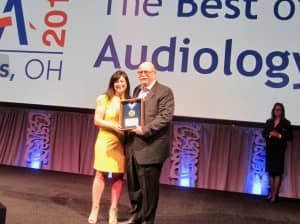
Dr Christensen presented George Cire with a Presidential Award for the education and training he has conducted in the area of bone-anchored hearing devices.
She was hopeful for upcoming legislative gains for audiologists, reminding members that AAA is the largest association completely devoted to Audiology and the convention is the largest gathering of audiologists in the world. “With the forthcoming monumental legislative collaborative effort between the Academy, ASHA, and ADA, including meeting with potential sponsors of that legislation…there has been an echoing thought that I’ve had: ‘What if we stopped competing with ourselves, and do what we do well with our profession and the patients that we serve with confidence.’”
Christensen ended her address by challenging audiologists to embrace the new level of competition in hearing healthcare based on “confidence with the profession and ourselves.”
AAA President-elect Catherine Palmer, PhD, made an appeal for members of the profession to focus on explaining the value of their skills and services, particularly as they relate to the incredibly important findings linking hearing health to physical and mental health, wellness, and quality of life. “We often talk about how important it is that others recognize what we do—and it is. However, it is just as important that we recognize what we do, and use language that reflects our place in the healthcare value chain. There has never been a better time to be an audiologist. We are experts in communication which is essential to the human condition; we are experts in balance which is critical to basic human survival.
It’s not about dizziness or balance; it’s about wellness, navigating your environment, and aging in place. We do not do hearing and balance tests. We do not sell devices. — Catherine Palmer, PhD
“It’s not about hearing; it’s about communication, brain health, and healthy aging,” continued Palmer who is a recognized expert in this area of research at the University of Pittsburgh. “The ear is the doorway to the brain.”
She stressed that the future will hold many, many new advanced tests and devices that we cannot even imagine today, but these should not be the primary things audiologists need to fear, resist, or obsess upon. Instead, audiologist should work to become an integral part of the healthcare team, creating personalized plans that reverse the effects of hearing and balance disorders. “What will it take to create this future?” Dr Palmer asked the audience of professionals. “1) Recognizing and embracing our place in the health care value chain; 2) Collaboration between the people in this room—academics who produce new knowledge, industry partners who create the tools to act on this knowledge, and audiologists who put this knowledge into action to impact lives; and 3) Collaboration with other healthcare professionals. We need to manage the assessment and treatment of hearing and balance problems when they are not the primary health concern but left untreated will negatively impact health outcomes.”
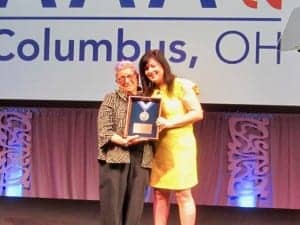
Pediatric audiology expert and author Jane Madell is presented with a Presidential Award by Dr Christensen.
President Christensen honored youngster Braden Baker of Ft Worth, Tex, with the AAA Inspiration Award. Baker helped raise over $120,000 via a GoFundMe campaign to help others get hearing aids while appearing on network TV shows like The Ellen DeGeneres Show. Also recognized with AAA President’s Awards were Rachel McCardle, PhD, for her educational efforts in training VA audiologists, Jane Madell, PhD, for her incredible work in pediatric audiology, George Cire, AuD, of Cochlear Americas for his ongoing work in bone-anchored hearing systems for conductive losses, and Erin Miller, AuD, for her organizing this year’s convention program.
The General Session closed with a keynote from behavioral scientist James Kane who spoke about the “The Loyalty Switch,” and showed how loyalty can be viewed as a strategy for convincing people that you are there to help them with three “motivational life forces”: safety/survival, optimization, and flourishing. He provided ideas about how one can build trust and confidence through the concepts of belonging, inclusion, and identity.
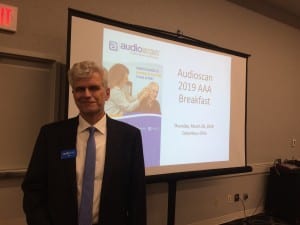
Audioscan President Jim Jonkman gets ready to address the crowd at the company’s annual breakfast for special equipment distributors on Thursday morning.
A diminished footprint for the 2019 AAA Expo. Although it should be emphasized that the exposition floor did feature over 150 companies, it was noticeably smaller compared to previous years. Several major global hearing industry companies downsized their presence considerably or even passed on the event entirely. This year, just three of the worldwide hearing aid manufacturers—Demant, Sivantos, and Widex (with the latter two companies in the process of merging into WS Audiology) had exhibits at the show. The long lines of attendees waiting to get a glimpse of the newest technologies were also generally missing, even though there were some exciting product launches. Examples included Oticon introducing its Opn S and Opn Play hearing aids, Signia launching its upgraded Styletto Connect and Signia Nx devices, and Widex showcasing its EVOKE hearing aids, the 2nd-generation SoundSense Learn AI technology, as well as its futuristic energy cell technology. Behind the scenes, Sonova, GN, and Starkey provided special presentations for press and customers.
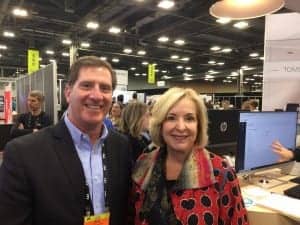
Lantos Technologies 3D ear scanning system was being showcased by Lantos’ CEO John Bojanowski and audiologist/consultant Susan Whichard.
Other exhibitors included the diagnostic and accessory products and upgrades, including those from Audioscan, the Demant Group (GSI, MedRx, Interacoustics, and Maico), Otometrics/Natus, and Inventis, which recently established its US headquarters in Minneapolis. On display were the products from at least five personal sound amplification product (PSAP) manufacturers—Bose, NuHeara, Lucid/Etymotic, IMHear, and Alango (BeHear)—which will probably be classified as “OTC hearing aids” after the US Food and Drug Administration (FDA) finalizes regulations for this new product class before the end of 2020 or in early 2021. Among many other offerings, EarLens was displaying its unique light-driven hearing system, and Lantos Technologies released their FDA-approved 3D ear-scanning system that is now ready to be implemented in dispensing offices.
On social media, some attendees expressed disappointment about the downsized exhibition, as well as the non-audiology companies that were aggressively hawking everything from wrinkle cream to massage chairs.
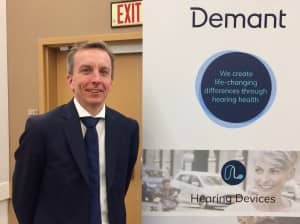
Demant CEO and President Søren Nielsen provided an overview of the Oticon Opn S and Opn Play at an investor and media presentation.
Special Events and Academy Honors. There was literally an educational highlight or feature session at any given time during the convention, with well over 200 seminars and educational opportunities. For example, on Wednesday, the convention was kicked off with the full-day 10th Annual Academy Research Conference (ARC) that had as its theme “Advances in Amplification” and featured presentations by David Eddins, PhD; Brent Edwards, PhD; Frank Lin, MD, PhD; Graham Naylor, PhD; Erin Picou, AuD, PhD, and Yu-Hsiang Wu, MD, PhD.
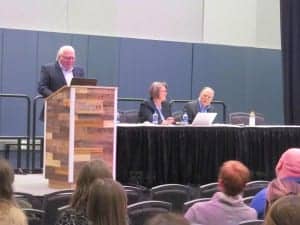
A look at the most interesting literature pertaining to hearing aids was provided by Gus Mueller, Catherine Palmer, and Bob Turner in their annual “Hearing Aids in Review” feature session.
Early on Friday morning, Patrick Feeney, PhD, Dawn Konrad-Martin, PhD, and Angela Garinis, AuD, PhD, covered ototoxicity monitoring for optimizing clinical outcomes in a feature session. Later that morning, the 15th Marion Downs Lecture, sponsored by Oticon, addressed autism spectral disorder and considerations for clinical care and was offered by Jolanta McCall, MA, MSc, Glenn Rall, PhD, and Christen Szymanski, PhD. Always a popular and entertaining session, the annual “Hearing Aids in Review” literature review and discussion was held on Friday afternoon by Gus Mueller, PhD, Catherine Palmer, PhD, and Robert Turner, PhD. Closing out Friday’s educational schedule was a special 3-hour feature session on reimbursement issues, titled “Audiology and Medicare: Where Economic Reality Collides with Hearing Care” presented by former Academy presidents Ian Windmill, PhD, and Barry Freeman, PhD, as well as James (Jay) Hall III and Jason Freeman, an actuarian who works in the area of Medicare reimbursement in Florida (and is Dr Freeman’s son).
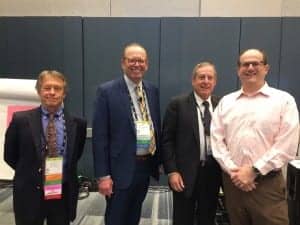
Jay Hall, Ian Windmill, Barry Freeman, and healthcare actuarian Jason Freeman presented the feature session, “Audiology and Medicare: Where Economic Reality Collides with Hearing Care.”
Saturday wrapped up with the 3rd Global Conference on Central Auditory Processing Disorder; a feature session on “Ethical Practices in Audiology” by Melissa Ferrello, AuD, Christine Lomey Ulinski, AuD, Alecia Soyk-Manning, AuD, and Alison Grimes, AuD; and a special session titled “Bridging the Accessibility Gap Through Teleaudiology,” by Rachel McArdle, PhD.
On Thursday evening, the Academy honored six individuals who have made outstanding contributions to the field and were recognized at a special Honors & Awards Banquet:
- Honors of the Academy: Angela Loavenbruck, EdD
- Jerger Career Award for Research: M. Patrick Feeney, PhD
- Humanitarian Award: Debra Fried, MS
- Outstanding Educator Award: Gail M. Whitelaw, PhD
- Marion Downs Pediatric Audiology Award: Alison M. Grimes, AuD
- International Award for Hearing: David T. Kemp, PhD
- Early-career Audiologist Award: Erin G. Piker, AuD, PhD
Next year. The AAA 2020 Convention will be held in New Orleans on April 1-4. For more information, visit: https://www.audiology.org

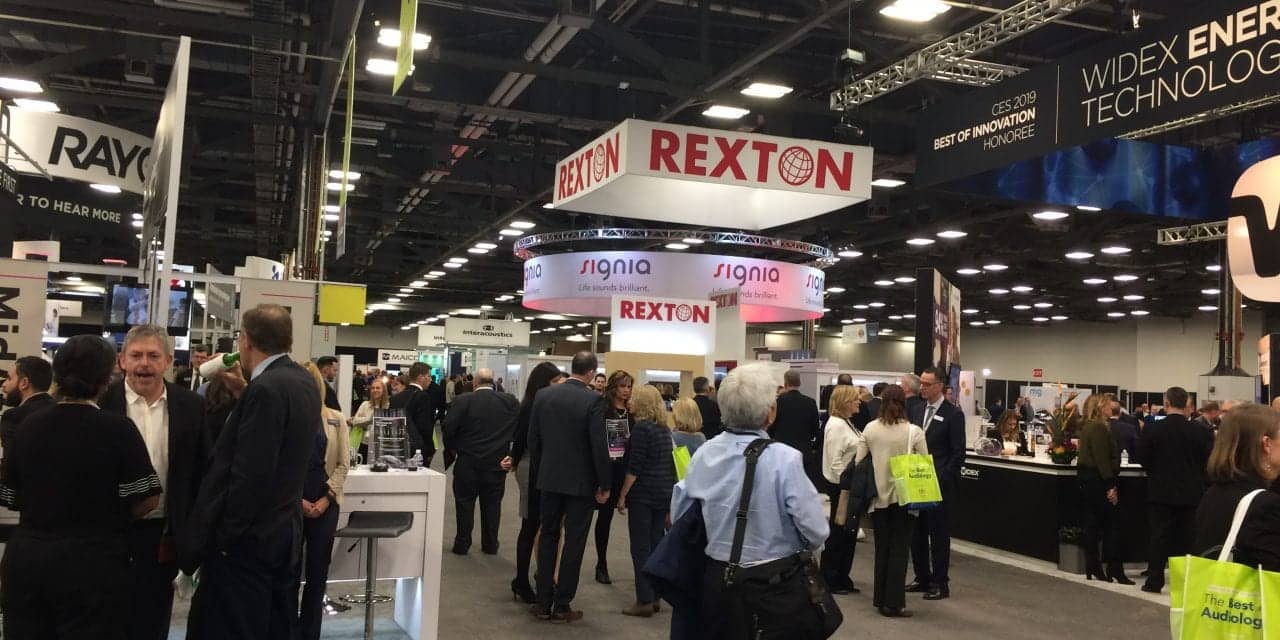
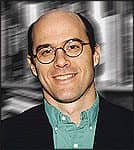

Thank you for this candid review and perspective. It’s refreshing to think that a slight shift in focus and greater collaboration with other medical professionals will lead to healthier lives for so many affected by hearing loss.
Our theory, at American Hearing Loop, is that if more audiologists advocated for ADA compliance for assistive listening technology in public spaces, more organizations would recognize that they have an obligation to do more for the 48+ millions with hearing loss and that would help everyone communicate more effectively and with less stress. For every person who needs a wheelchair ramp there are probably dozens with hearing aids or implants who need help with hearing and understanding more clearly when they are not at home.